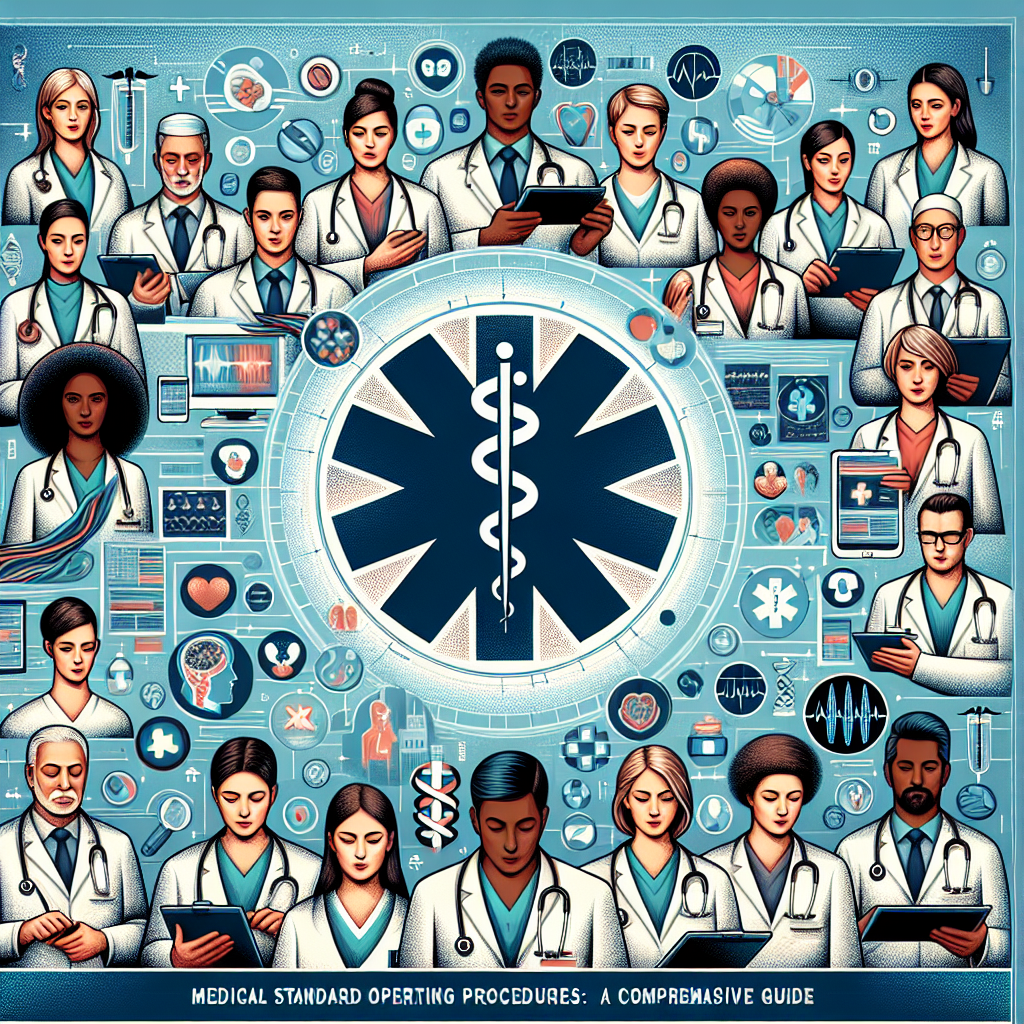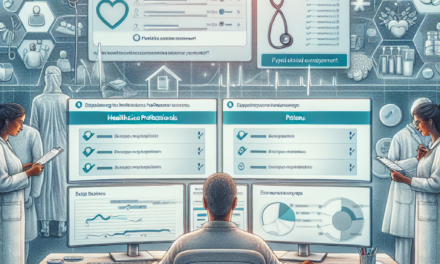Nextech’s Medical SOPs: A Comprehensive Guide

In the rapidly evolving field of healthcare, maintaining high standards of practice is crucial. Standard Operating Procedures (SOPs) are essential tools that ensure consistency, quality, and safety in medical practices. Nextech, a leader in healthcare technology solutions, has developed a comprehensive set of medical SOPs that are designed to streamline operations, enhance patient care, and ensure compliance with regulatory standards. This guide delves into the intricacies of Nextech’s medical SOPs, providing a detailed exploration of their components, implementation strategies, and the benefits they offer to healthcare providers.
Understanding the Importance of Medical SOPs
Medical SOPs are detailed, written instructions designed to achieve uniformity in the performance of specific functions. They are critical in healthcare settings for several reasons:
- Ensuring compliance with legal and regulatory requirements
- Standardizing procedures to improve efficiency and reduce errors
- Facilitating training and onboarding of new staff
- Enhancing communication and coordination among healthcare teams
- Improving patient safety and care quality
In this section, we will explore the significance of SOPs in the medical field, focusing on how they contribute to operational excellence and patient satisfaction.
The Role of SOPs in Compliance and Regulation
Compliance with healthcare regulations is non-negotiable. SOPs play a pivotal role in ensuring that healthcare providers adhere to the myriad of laws and guidelines that govern medical practice. These procedures are meticulously crafted to align with standards set by regulatory bodies such as the Joint Commission, the Food and Drug Administration (FDA), and the Centers for Medicare & Medicaid Services (CMS).
For instance, SOPs related to patient data management ensure compliance with the Health Insurance Portability and Accountability Act (HIPAA), safeguarding patient privacy and confidentiality. By following these standardized procedures, healthcare organizations can avoid legal pitfalls and potential fines, while also building trust with patients.
Standardization for Efficiency and Error Reduction
One of the primary benefits of SOPs is the standardization of processes, which leads to increased efficiency and a reduction in errors. In a busy healthcare environment, where time is of the essence, having clear and concise procedures helps staff perform their duties more effectively.
For example, SOPs for medication administration outline the exact steps to be followed, minimizing the risk of dosage errors. This not only protects patients but also enhances the overall workflow, allowing healthcare providers to focus on delivering high-quality care.
Facilitating Training and Onboarding
Training new staff can be a daunting task, especially in complex medical settings. SOPs serve as valuable training tools, providing new employees with a clear understanding of their roles and responsibilities. By having access to detailed procedures, new hires can quickly acclimate to their work environment, reducing the learning curve and increasing productivity.
Moreover, SOPs ensure that all staff members, regardless of their experience level, are on the same page. This consistency is crucial in maintaining a high standard of care across the board.
Enhancing Communication and Coordination
Effective communication and coordination are vital in healthcare settings, where multiple teams often work together to provide patient care. SOPs facilitate this by providing a common framework for all staff members to follow. This ensures that everyone is aware of their roles and responsibilities, reducing the likelihood of miscommunication and errors.
For instance, SOPs for emergency response outline the specific actions each team member must take during a crisis, ensuring a coordinated and efficient response. This not only improves patient outcomes but also enhances the overall functioning of the healthcare facility.
Improving Patient Safety and Care Quality
Ultimately, the goal of any healthcare organization is to provide safe and high-quality care to patients. SOPs are instrumental in achieving this objective by minimizing risks and ensuring that best practices are consistently followed.
For example, SOPs for infection control detail the necessary steps to prevent the spread of infections within healthcare facilities. By adhering to these procedures, healthcare providers can protect patients and staff from potential harm, thereby enhancing the overall quality of care.
Components of Nextech’s Medical SOPs
Nextech’s medical SOPs are comprehensive documents that cover a wide range of processes and procedures. They are designed to be user-friendly, ensuring that healthcare providers can easily access and implement them in their daily operations. This section will delve into the key components of Nextech’s SOPs, highlighting their structure and content.
Detailed Procedure Descriptions
At the core of Nextech’s SOPs are detailed procedure descriptions that outline each step of a specific process. These descriptions are written in clear and concise language, making them easy to understand and follow. Each procedure is broken down into manageable steps, ensuring that staff members can perform their duties with precision and confidence.
For example, an SOP for patient admission might include steps such as verifying patient information, obtaining consent forms, and conducting initial assessments. By providing a step-by-step guide, Nextech’s SOPs help healthcare providers maintain consistency and accuracy in their operations.
Roles and Responsibilities
Clearly defining roles and responsibilities is crucial in any healthcare setting. Nextech’s SOPs include detailed information on the roles and responsibilities of each team member involved in a specific process. This ensures that everyone is aware of their duties and can work together effectively to achieve common goals.
For instance, an SOP for surgical procedures might outline the responsibilities of the surgeon, anesthesiologist, and nursing staff. By clearly defining these roles, Nextech’s SOPs help prevent confusion and ensure that each team member knows what is expected of them.
Tools and Equipment
Many medical procedures require the use of specific tools and equipment. Nextech’s SOPs include detailed information on the tools and equipment needed for each procedure, as well as instructions on their proper use and maintenance. This ensures that healthcare providers have access to the necessary resources and can use them safely and effectively.
For example, an SOP for diagnostic imaging might include information on the types of imaging equipment required, as well as guidelines for their operation and maintenance. By providing this information, Nextech’s SOPs help healthcare providers optimize their use of technology and improve patient outcomes.
Quality Control and Monitoring
Ensuring quality control and monitoring is a critical aspect of any healthcare operation. Nextech’s SOPs include guidelines for quality control and monitoring, helping healthcare providers maintain high standards of care. These guidelines outline the necessary steps for monitoring processes, identifying potential issues, and implementing corrective actions.
For instance, an SOP for laboratory testing might include procedures for quality control checks, such as calibrating equipment and verifying test results. By following these guidelines, healthcare providers can ensure the accuracy and reliability of their operations.
Documentation and Record Keeping
Accurate documentation and record keeping are essential in healthcare settings. Nextech’s SOPs include detailed instructions on documentation and record keeping, ensuring that healthcare providers maintain comprehensive and accurate records. This not only facilitates compliance with regulatory requirements but also enhances communication and coordination among healthcare teams.
For example, an SOP for patient discharge might include guidelines for documenting patient information, discharge instructions, and follow-up appointments. By adhering to these procedures, healthcare providers can ensure that all necessary information is recorded and communicated effectively.
Implementing Nextech’s Medical SOPs
Implementing SOPs effectively is crucial to realizing their full potential. Nextech provides a structured approach to implementing their medical SOPs, ensuring that healthcare providers can seamlessly integrate them into their operations. This section will explore the key steps involved in implementing Nextech’s SOPs, highlighting best practices and strategies for success.
Assessing Current Practices
Before implementing new SOPs, it is essential to assess current practices and identify areas for improvement. This involves conducting a thorough review of existing procedures, identifying gaps and inefficiencies, and determining how Nextech’s SOPs can address these issues.
For example, a healthcare facility might conduct a review of their patient admission process, identifying areas where delays or errors occur. By understanding these challenges, the facility can tailor Nextech’s SOPs to address specific needs and improve overall efficiency.
Customizing SOPs to Fit Organizational Needs
While Nextech’s SOPs are comprehensive and well-structured, it is important to customize them to fit the unique needs of each healthcare organization. This involves adapting the procedures to align with the organization’s specific goals, resources, and patient population.
For instance, a rural healthcare facility might need to modify certain procedures to account for limited resources or staffing constraints. By customizing Nextech’s SOPs, healthcare providers can ensure that they are relevant and effective in their specific context.
Training and Education
Training and education are critical components of successful SOP implementation. Nextech provides comprehensive training programs to ensure that healthcare providers understand the procedures and can implement them effectively. This includes both initial training for new staff and ongoing education to keep existing staff up-to-date with any changes or updates to the SOPs.
For example, a healthcare facility might conduct regular training sessions to familiarize staff with new procedures or updates to existing ones. By investing in training and education, healthcare providers can ensure that their staff are well-equipped to deliver high-quality care.
Monitoring and Evaluation
Monitoring and evaluation are essential to ensure that SOPs are being implemented effectively and achieving the desired outcomes. Nextech provides tools and resources to help healthcare providers monitor the implementation of their SOPs, identify potential issues, and make necessary adjustments.
For instance, a healthcare facility might use performance metrics to evaluate the effectiveness of their SOPs, such as tracking patient wait times or error rates. By regularly monitoring and evaluating their SOPs, healthcare providers can ensure continuous improvement and maintain high standards of care.
Continuous Improvement and Feedback
Continuous improvement is a key principle of effective SOP implementation. Nextech encourages healthcare providers to regularly review and update their SOPs based on feedback from staff and patients, as well as changes in regulations or best practices.
For example, a healthcare facility might conduct regular feedback sessions with staff to identify areas for improvement or gather suggestions for new procedures. By fostering a culture of continuous improvement, healthcare providers can ensure that their SOPs remain relevant and effective in meeting the needs of their patients and staff.
Benefits of Nextech’s Medical SOPs
Nextech’s medical SOPs offer a wide range of benefits to healthcare providers, enhancing their operations and improving patient care. This section will explore the key benefits of implementing Nextech’s SOPs, highlighting their impact on efficiency, quality, and patient satisfaction.
Increased Efficiency and Productivity
One of the primary benefits of Nextech’s SOPs is increased efficiency and productivity. By standardizing procedures and providing clear guidelines, healthcare providers can streamline their operations and reduce the time and effort required to perform tasks.
For example, an SOP for patient scheduling might include guidelines for optimizing appointment times and reducing wait times. By following these procedures, healthcare providers can improve their workflow and increase the number of patients they can serve.
Enhanced Quality of Care
Nextech’s SOPs are designed to enhance the quality of care provided to patients. By ensuring that best practices are consistently followed, healthcare providers can deliver high-quality care that meets the needs and expectations of their patients.
For instance, an SOP for medication administration might include guidelines for verifying patient information and ensuring accurate dosage. By adhering to these procedures, healthcare providers can minimize the risk of errors and improve patient outcomes.
Improved Patient Safety
Patient safety is a top priority in healthcare settings, and Nextech’s SOPs play a crucial role in ensuring that patients are protected from harm. By providing clear guidelines for procedures such as infection control and emergency response, healthcare providers can minimize risks and ensure a safe environment for patients.
For example, an SOP for infection control might include guidelines for hand hygiene and the use of personal protective equipment. By following these procedures, healthcare providers can prevent the spread of infections and protect both patients and staff.
Compliance with Regulatory Standards
Compliance with regulatory standards is essential in healthcare settings, and Nextech’s SOPs help healthcare providers meet these requirements. By aligning their procedures with industry standards and guidelines, healthcare providers can ensure compliance with regulations and avoid potential legal issues.
For instance, an SOP for patient data management might include guidelines for maintaining patient confidentiality and ensuring data security. By adhering to these procedures, healthcare providers can comply with regulations such as HIPAA and protect patient privacy.
Increased Patient Satisfaction
Ultimately, the goal of any healthcare organization is to provide high-quality care that meets the needs and expectations of patients. Nextech’s SOPs help healthcare providers achieve this goal by ensuring that procedures are performed consistently and accurately, leading to improved patient satisfaction.
For example, an SOP for patient communication might include guidelines for providing clear and concise information to patients and addressing their concerns. By following these procedures, healthcare providers can enhance the patient experience and build trust with their patients.
Case Studies: Success Stories with Nextech’s Medical SOPs
To illustrate the impact of Nextech’s medical SOPs, this section will explore several case studies of healthcare organizations that have successfully implemented these procedures. These case studies highlight the benefits of Nextech’s SOPs and provide valuable insights into their real-world applications.
Case Study 1: Improving Efficiency in a Busy Hospital
A large urban hospital was struggling with inefficiencies in their patient admission process, leading to long wait times and patient dissatisfaction. By implementing Nextech’s SOPs for patient admission, the hospital was able to streamline their operations and reduce wait times by 30%.
The SOPs provided clear guidelines for verifying patient information, obtaining consent forms, and conducting initial assessments, ensuring that staff could perform their duties quickly and accurately. As a result, the hospital was able to improve patient satisfaction and increase the number of patients they could serve.
Case Study 2: Enhancing Quality of Care in a Rural Clinic
A rural clinic was facing challenges in maintaining consistent quality of care due to limited resources and staffing constraints. By customizing Nextech’s SOPs to fit their unique needs, the clinic was able to enhance the quality of care provided to their patients.
The SOPs included guidelines for medication administration, infection control, and patient communication, ensuring that staff could deliver high-quality care that met the needs of their patients. As a result, the clinic was able to improve patient outcomes and build trust with their community.
Case Study 3: Ensuring Compliance in a Specialty Practice
A specialty practice was struggling to keep up with changing regulatory requirements, leading to potential compliance issues. By implementing Nextech’s SOPs, the practice was able to ensure compliance with industry standards and avoid potential legal issues.
The SOPs included guidelines for patient data management, quality control, and documentation, ensuring that staff could adhere to regulatory requirements and maintain accurate records. As a result, the practice was able to protect patient privacy and build trust with their patients.
Case Study 4: Improving Patient Safety in a Surgical Center
A surgical center was facing challenges in ensuring patient safety during procedures, leading to potential risks and complications. By implementing Nextech’s SOPs for surgical procedures, the center was able to enhance patient safety and reduce the risk of errors.
The SOPs included guidelines for verifying patient information, ensuring accurate dosage, and maintaining a sterile environment, ensuring that staff could perform their duties safely and effectively. As a result, the center was able to improve patient outcomes and build trust with their patients.
Case Study 5: Increasing Patient Satisfaction in a Primary Care Practice
A primary care practice was struggling with low patient satisfaction due to long wait times and poor communication. By implementing Nextech’s SOPs for patient scheduling and communication, the practice was able to enhance the patient experience and increase satisfaction.
The SOPs provided clear guidelines for optimizing appointment times and providing clear and concise information to patients, ensuring that staff could deliver high-quality care that met the needs of their patients. As a result, the practice was able to improve patient satisfaction and build trust with their patients.
Conclusion: The Future of Healthcare with Nextech’s Medical SOPs
Nextech’s medical SOPs are powerful tools that can transform healthcare operations, enhancing efficiency, quality, and patient satisfaction. By providing clear guidelines and best practices, these SOPs help healthcare providers deliver high-quality care that meets the needs and expectations of their patients.
As the healthcare industry continues to evolve, the importance of standardized procedures will only grow. Nextech’s SOPs provide a solid foundation for healthcare providers to build upon, ensuring that they can adapt to changing regulations and best practices while maintaining high standards of care.
In conclusion, Nextech’s medical SOPs are a valuable resource for healthcare providers looking to enhance their operations and improve patient care. By implementing these procedures effectively, healthcare organizations can achieve operational excellence and deliver high-quality care that meets the needs of their patients.





